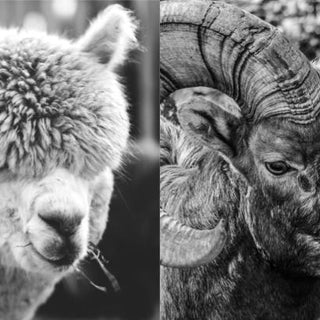Most Sustainable Wool
Alpaca is the MOST SUSTAINABLE FIBER. Check out why switching to alpaca wool makes your outdoor gear more eco-friendly.
Alpaca is the MOST SUSTAINABLE FIBER. Check out why switching to alpaca wool makes your outdoor gear more eco-friendly.

What makes a fiber most sustainable are determined by 4 factors: 1) the type of animal the raw material is extracted from 2) The social responsibility towards the workers and animals 3) any added chemicals that may harm land, animals, and workers and 4) textile biodegradability
Factor 1: Alpaca “Regenerative Agriculture”
Alpacas are the greenest animals on earth and a part of the regenerative agriculture. Regenerative agriculture is when soils, water, vegetation, and productivity improves agriculture instead of staying the same or slowly becoming worse. Alpaca improves our degraded environment by simply chewing on grass instead of yanking, allowing new grass to grow. Their hooves are padded and land softly against the ground. Their drinking habits are ecosystem friendly and their waste droppings are an all-natural fertilizer. And they are grazed on high altitudes which most animals cannot survive, so they put non-grazable land to good use.
Factor 2: Social Responsibility
Since the Pre-Inca times, Peruvian Alpaca farmers have not changed their system of non-harmful shearing. The shearing is done once or twice a year during certain seasons which allows them to re-grow their coats for winter weather. Alpacas give work from breeders to sorters to knitters, boasting the Peruvian economy. It is important to know almost all workers involved in the Alpaca wool process from raw material to finished natural garments are families. For example, Alpaca wool sorters are taught from their parents and pass down their sorting technique traditions to their children.
Factor 3: Non-chemical: Natural Wool Benefits
Alpaca farming does not involve any harsh chemicals making it safe and completely natural for the environment and people. Alpaca also has the biggest range of natural colors than any other wools. And, most importantly, this wool is naturally hypoallergenic, water resistant, and thermally insulating. It it also breathable and lightweight which makes it perfect for all weather seasons including summer.
Factor 4: Alpaca Wool 100% Natural
Like many pure organic wools, pure alpaca garments are 100% biodegradable. Arms of Andes garments are 100% alpaca wool with no other fibers. If you truly want to experience Alpaca wool, try out AoA! AoA Alpaca is warmer, stronger, lighter and softer than other high-end luxury items like cashmere and merino wool.

ALPACA or MERINO WHICH WOOL IS BETTER IN COOLING, WICKING, AND WARMTH INSULATION 1. How can the Alpaca wool be cooling if they don’t absorb any moisture? Alpaca fibres have...
Your cart is currently empty.
Start Shopping